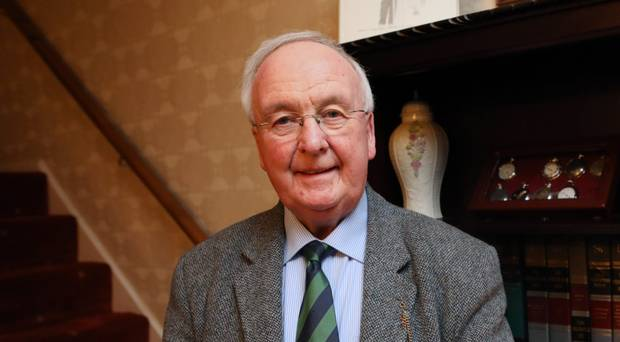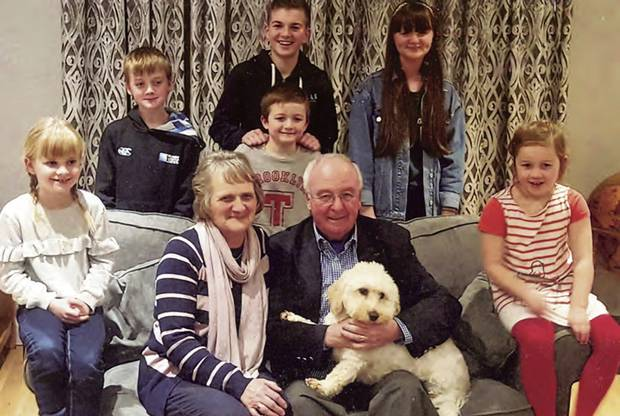A surprising new footballing footnote has been added to the George Best story by a well-known Belfast clergyman who’s revealed the previously unknown part played in the discovery of the Northern Ireland legend by an unsung hero, Ivan Little writes in the Belfast Telegraph.
Former Methodist President the Rev Jim Rea (Photo above) writes in a new book that Stevie Rutherford, a resident of the Cregagh estate where the late Manchester United star grew up, was the first person to spot his prodigious talents.
In Stories from the Street and Beyond, Mr Rea says that it was Mr Rutherford who told Old Trafford scout Bob Bishop to watch the youthful Best playing for Cregagh Boys Club.
And after he saw him in action, Bishop famously sent a telegram to United boss Matt Busby saying: “I think I’ve found you a genius.” The rest, as they say, is football history.
Mr Rea says Mr Rutherford lived in the next street to Burren Way where the Best family had their home.
“One day Stevie was watching a young lad playing on the nearby green and was so impressed by his amazing talent that he recommended him to Bob Bishop and that’s how George was ultimately signed for Manchester United,” adds Mr Rea.
“Although he used to tell the story humorously, Stevie never took any credit for spotting George.”
Mr Rea devotes one of the 150 short stories in his book to Mr Rutherford, who was the Boys’ Brigade captain of Newtownards Road Methodist Church when the cleric became minister there 40 years ago.
And he says that Mr Rutherford had an “amazing gift and ability” to encourage young boys to play football.
He adds: “He would pay for the pitch, referee the game, characteristically wearing his hat and top coat, with the whistle permanently in his mouth. And I’ve been told that it was Stevie who bought George Best his first pair of football boots.”
Mr Rea says his friend was motivated by a Christian desire to influence young footballers for good.
The author, who was awarded an MBE in 1994 for his services to the community, worked on the front line of the Troubles in many areas of Northern Ireland.
He was active behind the scenes in trying to end the violence by meeting with rival paramilitary leaders and in Portadown, where he was a minister at Thomas Street Methodist Church, he was involved in mediation work on the Drumcree impasse.
In his new book, Mr Rea doesn’t dwell on the Troubles or the main “players”, concentrating instead on his reflections on many of the “other” people that he encountered during his colourful life, men and women who helped to shape his thinking.
Many of those he writes about are now dead, and Mr Rea says: “I was trying to mark their memory in history in some way. There was something about them which made them very special.”
The absence of stories about the Troubles in the book might come as a surprise to readers.
“I took the view that many of the conversations I’d had with people who’d been involved in the Troubles were confidential,” says Mr Rea.
“And I didn’t feel the time was right for me to write about the Troubles and my work in the background,” he continues. “I may bring out another book exploring those times but this isn’t the one. And I hope it encourages people.”
One of the most remarkable stories he tells is about meeting the medic who saved his life, which almost ended before it began.
Doctors at the Royal Maternity Hospital had told his father that his son was almost certainly dead in the womb and that it might be difficult to save his wife.
But as friends and family prayed, the young Jim Rea was delivered by Caesarean section – and his mother was fine, too.
The obstetrician was Jack Pinkerton and, as Mr Rea trained for the ministry, he met him by chance in 1969 at a lecture he was giving on medical ethics.
“I had an opportunity to thank this amazingly gracious surgeon who would ultimately hold the chair at Queen’s University Belfast in gynaecology and obstetrics,” says Mr Rea. “He was a world leader in his field and he would become a generous supporter of my work.”
Jim Rea with his wife Carol and their grandchildren
Mr Rea (74) retired nine years ago but he still works part-time on the Shankill and Woodvale, preaching regularly and carrying out pastoral visits despite a couple of health issues.
During his presidency of the Methodist Church in 2003, he suffered a heart attack after conducting a Remembrance Service but within three weeks he was back working again after receiving stents.
Three years later he was diagnosed with a neurological disease, myasthenia gravis, but he’s “on treatment for that”.
“I’m doing okay but I’m open to infections,” says Mr Rea, who left school in north Belfast at the age of 15.
“I wasn’t a very good pupil,” he laughs. “I didn’t value education. So, when I left school I had no qualifications of any kind. But I met the Rev Sydney Callaghan who was minister of a church in north Belfast and he had a particular influence on my life.
“I was contemplating becoming a minister but I thought the bar for entry into theological college was too high for me.
“However, Sydney Callaghan encouraged me to study and that’s what I did to get the qualifications I needed to be accepted to train for the ministry.”
The Troubles were intensifying as Mr Rea took up his first clerical posts. “I was in Fermanagh and saw some of the terrible atrocities there,” he says.
He also recalls digging people from the rubble of the Red Lion pub on the Ormeau Road in Belfast after a bomb attack which claimed the lives of three people and injured 30 others.
Mr Rea spent 21 years as a minister in east Belfast where the Troubles had a huge impact.
As minister of Newtownards Road Methodist Church – which Mr Rea later developed into East Belfast Mission, now the Skainos centre – he forged a close working relationship with the Catholic church a short distance away.
In many ways it seemed like the most natural thing in the world to a man who had many Catholic relatives in his wider family.
He says: “I never grew up with any sense of bigotry. I detested it. I detested attitudes that demeaned people because of their religion.
“That was really in my DNA and it fitted well with the Methodist Church because to this day I see people as people and I don’t put labels on them.”
Mr Rea says he learnt priceless life lessons from his grandfather who worked in the shipyard.
He adds: “He was a very tolerant man who was moderate in his outlook, especially in those days when what we would have called ‘Big House Unionism’ ran the country.
“My grandfather probably was influenced by the Labour Party. He used to tell me about Keir Hardie, the founder of the party.”
But did he ever think of becoming a politician himself? “No, not really,” Mr Rea replies.
“All political careers end in failure, according to Enoch Powell.”
Mr Rea, who has a Master of Theology degree from the University of Oxford, has for over 40 years been a regular contributor to BBC Radio Ulster’s Thought for the Day insert and to Downtown Radio’s Just a Moment segment.
He says: “In 1977 I was asked to become a religious adviser at Downtown. I was in Irvinestown at the time and there was a lot of travelling involved but I enjoyed the work immensely and it led to the BBC’s Thought for the Day.
“It was a bit like the old Methodist preaching in the open air and I thought broadcasting was akin to the greatest open-air opportunity that anyone could ever have.”
In his book, Mr Rea reveals how the broadcast of a church service in Belfast lifted the spirits of Beirut hostage Terry Waite in the 1980s.
The English cleric wrote in his memoir Taken on Trust that after he was given a radio by his captors, he heard an elderly man praying for him on the BBC World Service.
After his release Mr Waite tracked down the cleric to Belfast and the Rev Ted Edwards was surprised to be contacted by the ex-hostage who thanked him for his “hope and encouragement”.
Mr Rea still broadcasts a couple of times a week and writes newspaper columns, too.
But what about the current political situation in Northern Ireland – is he optimistic?
He replies: “I’m an optimist when it comes to the Kingdom of God but we are going through difficult and very messy times here. What is badly needed is statesmanship.
“The Rev Eric Gallagher [a former Methodist President] once said to me that in order to be an effective politician, one needed to have the support of the majority and the respect of the minority. And I think that’s my challenge to politicians here.”
Football fan Mr Rea was a Cliftonville supporter in his younger days when he used to go to Solitude with his grandfather.
But now the football wheel has turned full circle and Mr Rea takes his grandsons to watch Dundela in the Bluefin Sport Championship at Wilgar Park, not far from his east Belfast home.
“I was chaplain at Portadown Football Club for many very enjoyable years,” says Mr Rea, who is also a cricket fan and a brass band enthusiast.
“I have a background in brass bands,” he says.
“I used to play the clarinet and I have a great affection for the Salvation Army and their music.”
Mr Rea is hoping that his book will strike a chord with readers and all the money from its sales will go to organisations which help the homeless in east and west Belfast.
Stories from the Streets and Beyond by Jim Rea, £12.95. Available from bookshops and Amazon UK
Belfast Telegraph
DraggedImage.2321966cd706488ba4fddf11149c34ac.png
DraggedImage.fe1d297abc4f46f9964fb9d2f2deface.png




